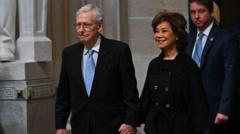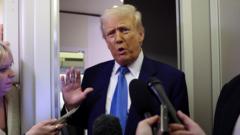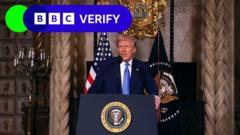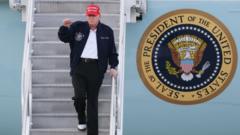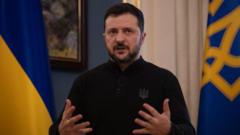Amid diplomatic efforts between the US and Russia, Ukrainians remain deeply engaged in the war, voicing skepticism over peace talks led by Donald Trump and Vladimir Putin without their inclusion. On the ground in Sumy, the harsh realities of conflict dominate the conversation, with many questioning the feasibility of any agreement that overlooks the sovereignty and security needs of Ukraine.
The Complexity of Peace in Ukraine: Perspectives Amid Trump and Putin's Negotiations
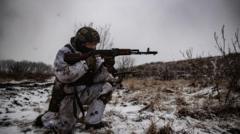
The Complexity of Peace in Ukraine: Perspectives Amid Trump and Putin's Negotiations
As US and Russian delegations engage in discussions, the realities of war play out in Ukraine, where soldiers and civilians reflect on the prospects of peace and distrust.
Ukraine's landscape, marked by conflict and resilience, sharply contrasts with the discussions occurring between American and Russian delegations in Saudi Arabia. US President Donald Trump's recent engagement with Russian leader Vladimir Putin has raised concerns about the stability of the transatlantic alliance and the implications for Ukraine. President Volodymyr Zelensky has expressed apprehension over negotiations that take place "behind the back of key parties" affected by the ongoing war — a sentiment echoed by many Ukrainians.
On the eastern front in Sumy, Ukrainian soldiers remain focused on their fight against Russian aggressors, seemingly indifferent to the diplomatic maneuvers occurring abroad. A Ukrainian officer, identified only as "White," emphasized that for those on the battlefield, Trump's overtures to Putin are merely noise in a war that demands their attention. His designated area remains embroiled in conflict as they prepare for imminent operations in Kursk, indicating a fierce determination despite shifting political tides.
Meanwhile, inventive local artisans are crafting drones from inexpensive materials, symbolizing the ingenuity and resolve of the Ukrainian forces. These drones have proven effective in dismantling advancing Russian units — a stark reminder that military strategies continue to evolve, even as talks seek a resolution.
The civilian impact of the war remains profound in Sumy, where the aftermath of a recent drone attack has left a gaping hole in a residential block, prompting fear and evacuation among residents. Conversations with locals reveal a shared yearning for peace; however, there is a prevailing sentiment that trust in Russian promises is nonexistent. Individuals like Mykola and Yuliia express that true peace is conditional on a cessation of hostilities from the aggressors.
As the sun sets and the streets grow quieter, former Soviet officer Borys voices the hesitant hope for peace, recognizing a need for strength before any negotiations can yield satisfactory outcomes. He, along with many others, believes Ukraine must resist and negotiate from a position of power rather than surrender.
In light of these substantial insights, it becomes evident that Trump's approach to potentially broker a rapid peace might clash with the intricate realities of the conflict. Any meaningful resolution would require engagement with, and the consent of, Ukraine and its allies, emphasizing that diplomacy is not as easily packaged as business negotiations. As the international community observes with bated breath, the road to peace in Ukraine appears fraught with complications, demanding patience and careful consideration from all parties involved.


